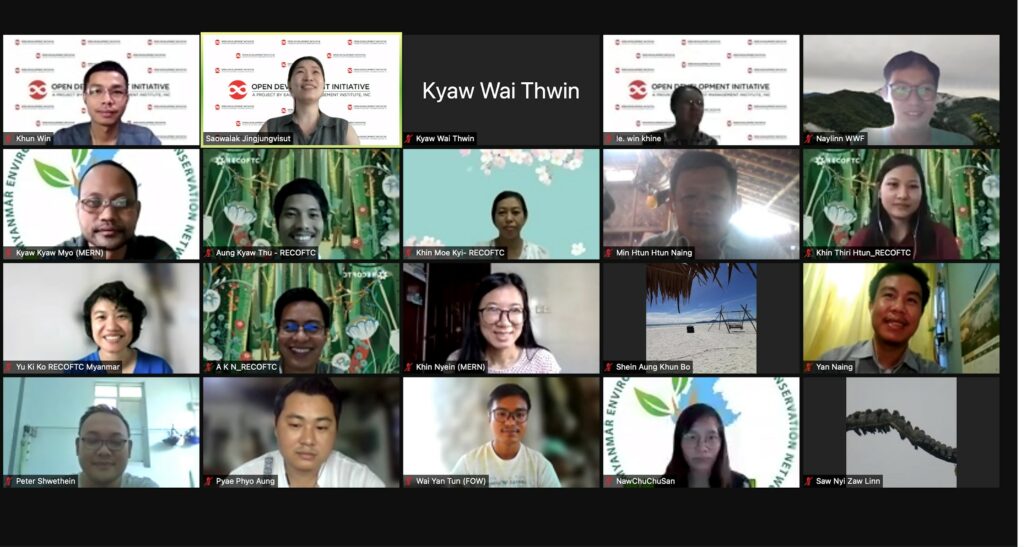V4MF Myanmar: CSOs in Myanmar Gain Data Literacy for Forest Advocacy
Civil society groups of Myanmar’s forestry sector identified a need to improve data skills and showed efforts in data literacy to drive forest-related advocacy campaigns.
Open Development Initiative (ODI), an initiative of East-West Management Institute (EWMI), has offered a series of face-to-face training sessions on data literacy for forestry network and environmental advocacy organizations in Thailand, Vietnam, and Lao PDR. Most recently, we completed a similar training, but organized virtually because of the pandemic and recent political unrest, for civil society organizations (CSOs) in Myanmar.
From October to November 2021, nineteen participants from five organizations actively participated in and successfully completed the virtual training program. They were representatives from RECOFTC Myanmar, Myanmar Environmental Rehabilitation-conservation Network (MERN), WWF Myanmar, Landesa, and Friends of Wildlife.
All participants were sponsored by the Voices for Mekong Forests (V4MF) project, a five-year initiative funded by the EU, which was completed in December 2021. V4MF aimed to strengthen the voices of civil society, Indigenous Peoples, the private sector, and local community groups to engage in and influence forest governance in Cambodia, Lao PDR, Myanmar, Thailand, and Vietnam. The project supported the EU’s FLEGT initiative and the United Nations’ “Reducing Emissions from Deforestation and Forest Degradation” (REDD+) initiative.
A visualization of training participants
Most participants considered themselves to be data collectors/users, while one of them was a media professional. The data literacy curriculum was tailored to meet their needs and the context of Myanmar in relation to forest issues, community land, and environmental cases. We found it to be a major challenge to engage participants virtually and to practice relevant data techniques and tools during the remote learning process, yet participants still found the course valuable.
The training was split into 8 online sessions, including: an introduction to the concept of data; finding data; cleaning data; organizing and standardizing data; and finding stories in a dataset. Selected online tools were introduced to the participants, such as the “Mapeo” mobile application for field data collection, “Datawrapper” for data visualization, “Flourish” for data visualization and storytelling, and “Google Data Studio” for designing data dashboards. Practical sessions were included to ensure that participants learned to work with datasets and tell stories with the data. Participants also learned about digital security and data sovereignty that are key principles for daily lives.
From the survey at the end of the training, we learned that half of the participants expressed confidence in using “Pivot Tables” for data analysis, and had interest in practicing using the data visualization tools that were introduced. Many participants showed curiosity in extending the use of the open-sourced mobile application, “Mapeo,” which can collect data offline and is designed for non-technical villagers. Major feedback was about the overall value of the training and learning useful techniques that could be applied to their work. The participants found data literacy to be a very useful knowledge and skill training for them, and believe that it is crucial for their work and their daily tasks.
Why data literacy?
While it is well-recognized that using data is increasingly important for environmental activists to advance forest governance and create evidence-based interventions, one of the common challenges is the low data literacy among both CSOs and the citizens who are the main beneficiaries of their programs. Considering emerging technologies and open-sourced tools, data literacy training is crucial for the program investment. It helps to build peoples’ ability to use and understand data and advance their role from data users to data producers.
The ODI has stressed the need for CSOs to improve their capacity to use, translate, analyse, and present data in advancing their work. The ODI aims to build a citizenry within the Mekong that can use data to push for policy reform, advocate for important social change, and improve the environment. This citizenry will be data literate and able to analyse information that they are producing or that is being provided to them. With this new knowledge in hand, they will be also able to demand greater data transparency from their governments. We have deliberately targeted marginalised and disenfranchised demographic groups in this effort.
The ODI team is committed to mentoring participants who plan to share their data literacy knowledge with their colleagues and wider networks. We are willing to provide technical support, share lessons learned, and tailor the data literacy program to meet specific needs. To learn more about the data literacy program, check out related stories and past programs on the ODM Website.
A screenshot of training participants on the first session


